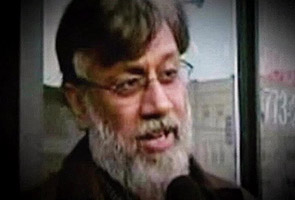 CHICAGO (AP) -- A federal jury convicted a Chicago businessman on Thursday of helping plot an attack against a Danish newspaper that printed cartoons of the Prophet Muhammad but cleared him of the most serious charge accusing him of cooperating in the deadly 2008 rampage in Mumbai.
CHICAGO (AP) -- A federal jury convicted a Chicago businessman on Thursday of helping plot an attack against a Danish newspaper that printed cartoons of the Prophet Muhammad but cleared him of the most serious charge accusing him of cooperating in the deadly 2008 rampage in Mumbai.
The jury reached its verdict after two days of deliberations, finding Tahawwur Rana guilty of providing material support to terrorism in Denmark and to the Pakistani militant group that had claimed responsibility for the three-day siege in India's largest city that left more than 160 people dead, including six Americans.
The jurors, who were not identified in court, declined to talk to the media to explain their split verdict. Rana, a Canadian national who has lived in Chicago for years, faces up to 30 years in prison on the two charges.
"We're extremely disappointed. We think they got it wrong," defense attorney Patrick Blegen told reporters.
At the center of the trial was testimony by the government's star witness, David Coleman Headley, Rana's longtime friend who previously pleaded guilty to laying the groundwork for the Mumbai attacks and plotting against the Danish paper after it printed the cartoons in 2005, angering many Muslims because pictures of the prophet are prohibited in Islam. That attack was never carried out.
Rana, who did not testify, was on trial for allegedly allowing Headley to open a branch of his Chicago-based immigration law services business in Mumbai as a cover story while Headley conducted surveillance ahead of the November 2008 attacks. He was also accused of letting Headley travel as a representative of the company in Copenhagen.
The trial was highly anticipated because of Headley's testimony. His five days on the stand provided a rare glimpse into the inner workings of the Pakistani militant group Lashkar-e-Taiba, which took credit for the Mumbai attacks, and the alleged cooperation with Pakistan's top intelligence agency known by the ISI. The trial started just weeks after Navy SEALs found Osama bin Laden hiding outside Islamabad, raising concerns that Pakistan may have been protecting the world's most wanted terrorist.
Pakistani officials have denied the allegations and maintained that it did not know about bin Laden or help plan the Mumbai attacks.
During his testimony, Headley described how he said he took orders both from an ISI member known only as "Major Iqbal" and his Lashkar handler Sajid Mir. Through emails, recorded phone conversations and his testimony, he detailed how he met with both men - sometimes together - and then communicated all development's to Rana.
Prosecutors made a Sept. 7, 2009, recorded phone call between Rana and Headley the centerpiece of their evidence against Rana. In the call, the men discussed the Mumbai attacks and Headley talked about future targets, including the Danish newspaper Jyllands-Posten.
"Rana and Headley were playing on the same team," Assistant U.S. Attorney Victoria Peters said during closing arguments.
Rana's defense attorneys spent much of the time trying to discredit Headley who they say duped his longtime friend. They attacked Headley's character saying how he initially lied to the FBI, lied to a judge and even lied to his own family. They claimed he implicated Rana in the plot because he wanted to make a deal with prosecutors, something he'd learned after he became an informant for the U.S. Drug Enforcement Administration after two heroin convictions.
Headley's cooperation means he avoids the death penalty and extradition.
After the verdict was read, one of Rana's attorneys approached his wife and said "I'm sorry," then huddled with her in conversation. A day earlier, Rana's wife, Samraz Rana, told The Associated Press that Headley and her husband were not as close as prosecutors had portrayed during the trial.
While much of Headley's testimony had been heard before - both through the indictment and a report released by the Indian government last year - he did reveal a few new details. Among them was that another militant leader Ilyas Kashmiri, who U.S. officials believed to be al-Qaida's military operations chief in Pakistan, had plotted to attack U.S. defense contractor Lockheed Martin. Kashmiri was reported killed on June 3 by U.S. drone attacks inside Pakistan. While U.S. officials haven't confirmed the death, Pakistani officials say they're certain Kashmiri is dead.
The trial was also the public's first chance to get a glimpse of the admitted terrorist who in a voice so soft attorneys had to repeatedly ask him to speak up while he detailed how he posed as a tourist while he took hours of video surveillance ahead of the attacks on India's largest city. Mir, Iqbal and Kashmiri were charged in absentia, along with three others, in the case. Rana was the only defendant on trial.
---
Associated Press writer Deanna Bellandi contributed to this report.
Portland and Seattle
Free Subscription to Breaking News
Free Subscription to Breaking News






















































































































































































































































































































































